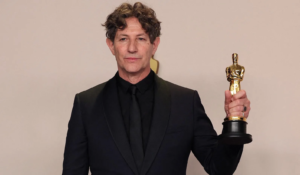On Monday, Simon & Schuster announced that Dana Canedy, the administrator of the Pulitzer Prizes and a former reporter for the New York Times, will become its senior vice-president and the publisher of its flagship imprint. Canedy won a Pulitzer two decades ago, at the Times, for her work on the series “How Race is Lived in America.” Canedy also published a book, “A Journal For Jordan,” in 2008, about the death of her fiancé while he was serving in Iraq. She will become the first Black person to take over a major publishing imprint. Simon & Schuster, which is owned by ViacomCBS, is one of the largest publishers in the country, but it is also up for sale as changes and mergers continue to roil the book world.
I spoke by phone with Canedy on Wednesday, three weeks before she begins her new job. During our conversation, which has been edited for length and clarity, we discussed the different types of diversity she hopes to usher in, the ways in which the publishing industry differs from journalism, and whether she would publish President Trump’s memoirs.
What exactly will your job consist of, both in terms of, like, your larger conception of it and what you will be doing on a day-to-day basis?
On a day-to-day basis, I think the most important thing initially will be getting to know the staff, getting familiar with the books that we have in the pipeline, and so forth. I think, over all, what I bring to this is a vision for continuing to do the excellent work that Simon & Schuster and the team in place are already doing, but to broaden the scope of it. I’d love to see more narrative nonfiction books, for example, the kind of books that take hold of you in the middle of the night, and then you’re saying, “O.K., I know I need to go to sleep, but just one more page.” I think there’s a place for bringing in big-name authors but also emerging voices or unknown voices. That’s exciting. More diversity in subject matter—there’s always room for that, particularly now in this country. So those are the things I think I’m thinking of initially.
I think in addition to that, Jonathan Karp, the C.E.O., and I agree that the most exciting books are ones that, when pressed, it’s hard to think of a list of comparable titles. And there’s so much going on in the world right now that issues of politics, and climate, and race relations, and poverty, and the aftermath of the pandemic, if we were getting to that point, I think will be rich areas to explore.
Karp has talked about how interested people are in the Trump Administration. And obviously Simon & Schuster has published a lot about the Trump Administration. I noticed that you talked about a diversity of subject matter and narrative nonfiction. Do you have some concern that the book world has been overly focussed, or maybe I should say readers have been overly focussed, on the President and the Administration at the expense of other stories?
I don’t think so. I think people have broad interests, and I think that to some extent it’s the role of the publisher to lead in terms of what people are reading. But it’s also the role of the publisher to respond to what people are already reading and asking for. So there’s a place for both. I mean, Trump’s a huge story, and he insists on being a huge story just in the way he approaches his job. And so I think it would be a dereliction of duty for journalists and authors not to focus on him to the extent that they are.
I noticed you said a diversity of subject matter. You didn’t say, unless I missed it, diversity of authors. I assume that’s important to you.
Oh, my gosh. Of course. That goes without saying. You can’t have a diversity of subject matter without having a diversity of authors. You just can’t.
I heard an answer you gave in another interview about the book “American Dirt.” You were asked what you thought about people being offended, and I’m paraphrasing, but you said that, in some ways, the most important thing was not who writes these stories but that these stories are told accurately and representatively. Can you talk a little bit more about what you meant by that?
Absolutely. Early in my career, when I was a reporter in Cleveland, Ohio, I went to a community in Ohio that had a large Amish population, and I spent four days on Amish farms and wrote a series on the Amish. I’m a Black woman from Kentucky. And that series was very well received internally and by our readers at the time. So the thing to do when you’re doing a story or a book where you are not the authority is to acknowledge that and then become the authority. So it really doesn’t matter what the subject matter is. If you’re going to write about anything, you have to be authoritative. Whether you’re writing about climate or people, you have to present an authoritative, true, and accurate picture of what it is you are trying to say. That’s just the baseline for a successful book.
What’s your relationship like with books? Have you always been a big book reader?
Oh, gosh, yes, yes, yes, yes. I started reading books when I was very young. But I also started writing at the age of twelve, and I was obsessed with it. My son—he’s fourteen—gave me this nickname a few years ago of Word Nerd because I’m always reading. We have books all over our house, and I read in bed. I read at the beach. I read in the kitchen. And, years ago, I bought these glasses that have night lights attached on the side, because my son used to like to come into my room and curl up next to me to sleep. And, in order to get him to sleep, I needed to turn off the lights, but I didn’t want to stop reading.
He’s into anime right now, but books are a way to escape. They’re a way to inform yourself. They are a way to empower yourself, depending on what you’re reading and what your needs are at the moment. I mean, there’s just nothing like them. I even like the smell of books. I like the feel of the pages, especially a book made with a good heavy stock. I remember, when I wrote my book, holding it for the first time, and there’s just something visceral about holding a book in your hands, especially a heavy book.
Who are your favorite authors, and who are you reading now that you really love? Do any names come to mind?
Yeah, so I obviously love Maya Angelou. My gosh, I just reread, given the moment that we’re in, the Frederick Douglass biography by David Blight. One of my favorite books is “American Tapestry.” Do you know that one?
ADVERTISEMENT
No, what’s that?
Rachel Swarns wrote a book called “American Tapestry,” about Michelle Obama’s white ancestors. It’s fascinating. One of my favorite other books is Katharine Graham’s “Personal History.” I love that book. I think I’ve read it three times. She’s a hero of mine.
Are you at all worried about how you’re going to keep that romantic notion of books now that you’re entering the book world and making it your work?
Well, no, I don’t think so. I find this work to be a calling. If I can keep a romantic notion about journalism, which I also have after working twenty-plus years at the New York Times, I can do the same with books being in the publishing world. I don’t worry about that. I’m somebody who lives with a lot of optimism, enthusiasm, and passion. And I don’t think there’s really anything that can rob me of that. If I can get through the tragedy I went through in my life, losing the man I love when our son was just six months old, and finding my way back, eventually, to a place of joy and happiness, I don’t think I’d be shaken up by being on the inside of an industry that I love, you know?
What do you think you bring to this job from your journalistic background?
Well, remember, it’s not just my journalism background. I’ve been running the Pulitzer Prizes for the last few years. So I’ve been immersed in books because we have five books categories. And I’ve been announcing the winners of those for years and reading those books. I selected the jurors who judged those books and gave them their guidance about what we were looking for, and listened to the board deliberations around that. So I’ve been immersed in books for several years.
But, in addition, I think the best nonfiction books are reported books. They don’t have to be written by journalists, but they have to be reported. Going back to the point you made about authenticity, to write authoritatively, you have to sort of put on a reporter’s hat. So I think my training is going to be a strength in terms of looking at proposals and manuscripts and with an editor’s eye—a journalist’s and an editor’s eye.
I think a lot of people don’t know that not all books are fact-checked. And that’s an especially interesting issue now, because we’re in a climate where the idea of things not being fact-checked or true is a big concern, but that hasn’t extended to the book world. Should all nonfiction works, especially ones about politics or history, be fact-checked?
I think that we have to trust our authors, and select authors that we believe in, who present their manuscripts and their ideas in a way that they are already authoritative and already reflect the work that they’ve done to set out what the story is going to be. And I also think that there are some amazing editors at Simon & Schuster who have handled some big books. They know what to look for. Sure, in an ideal world, I would have loved fact checkers at the New York Times in every story I wrote. But I think there’s a track record and a system in place at Simon & Schuster and other publishers that brings about the results, successful results. I don’t have to—what is that expression, “remake the wheel”? I want to build on the success that they have.
I didn’t mean to imply that your writers were untrustworthy. I meant that people make mistakes. And there’s just been so much concern about this in the journalism world. And that’s why I was asking—
A mistake is different than being sloppy, though. I mean, everybody makes mistakes. If you’re not making mistakes, you’re not growing. And, obviously, you don’t want a mistake in your copy. But I can live with a mistake. What I couldn’t live with is sloppiness. And there’s a difference.
Let me ask you about that. There has been lots of concern about allowing ideas that are deemed dangerous, or alt-right, to use one example, into the public sphere in a way that causes turmoil at magazines or newspapers, and among readers. Simon & Schuster has a conservative imprint that publishes Candace Owens and Glenn Beck and Donald Trump. I’m wondering what you think about publishing those kinds of books and whether you think that that is good for the public debate.
Well, of course it is. I’m not into censorship, but I do think there has to be a fine line between books that inform the reader about different perspectives, that maybe open them up to a way of thinking about the world or an issue in ways that they haven’t, and that work that’s dangerous or somehow doesn’t add public value, if you will. Those kinds of books I wouldn’t be interested in at all.
But I do think that there are people who think it’s controversial to write books about race, or the Black Lives Matter movement. So the most provocative books, just like the most provocative journalists, are always going to have supporters and detractors. And sometimes the book that is the most controversial, the newspaper articles that are the most controversial, are controversial because they’re hitting people viscerally and making them think, and that’s not a bad thing. Now, something that’s inflammatory just for the sake of being inflammatory, I don’t think has any place at Simon & Schuster, or the New York Times, or anywhere else. It has to be a larger message of broader purpose.
The reason I brought up Glenn Beck, Trump, and Candace Owens is that I’m not sure that there is a larger purpose, or that the purpose is to be something other than inflammatory. And I do think it’s interesting that the debate about whether those voices should be paid to offer their opinions by companies that are engaging in free expression hasn’t hit the book world in the same way.
Yeah. I think you have to look at it on a case-by-case basis, honestly. Some of those books do have a place, and some don’t. And I’m hopeful that I’ll know them when I see them.
Jonathan Karp has published a couple of the President’s books. I assume the President, when he stops being President, will want to write more books. How would you feel about publishing his books in the future at Simon & Schuster?
You mean Trump’s books?
Yeah.
Oh, he’s the President. Everyone who leaves the White House has one or more books in them and that becomes part of public history. I think that would be not only appropriate but important.
O.K. It feels like maybe this is a little different. I won’t make a joke about whether that book should be fact-checked, but I think you see what I’m getting at.
Yeah.
But you don’t find the issue of whether to do that particularly complex? You seem to be very clearly on the side of free expression and think every form of it is a good thing.
Yes, but as I said, it has to be taken on a case-by-case basis. But, in terms of the specific question about the President, every President who leaves office writes their memoirs, their personal history, what have you. And it becomes part of American history. And I don’t see that that’s going to be any different with a Trump book.
Publishing is always talked about as being endangered, at least in the past couple of decades. Books have always been talked about as being in danger. Are we going to be done with books—are there going to be e-books, are there going to be no books? Is that something you worry about?
I don’t buy it at all. I think there are lots of word nerds out there like me. I used to say this in journalism. When folks talk about newspapers no longer being around, it may not be in paper form in the future, but this country will always have a need for information. Whether that’s newspapers, magazines, or books, one of the beauties of this country is we have a very literate population, a very engaged population, a very curious population, and that’s not going to change. And books aren’t going anywhere. How you read them, whether you read them on a phone or in the dead-tree version, doesn’t really matter, but they’re not going anywhere. There are too many important voices and important stories to tell.




